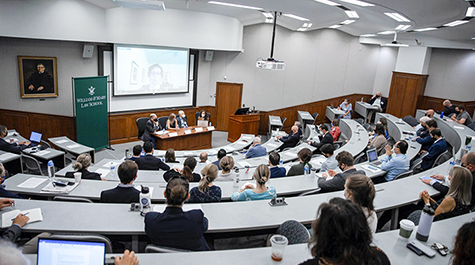William & Mary Law School’s Annual Supreme Court Preview Examines Upcoming SCOTUS Term
William & Mary Law School’s Institute of Bill of Rights Law (IBRL) held its 34th annual Supreme Court Preview on September 10-11, 2021. The event brought distinguished experts from around the nation to the Law School to discuss the Court’s upcoming term, and was the first Preview to be both in person and live streamed.
“I am absolutely thrilled to welcome you to the annual Supreme Court Preview,” said Allison Orr Larsen, Director of the IBRL, in her introductory remarks. “It is my favorite weekend of the year, and it’s particularly special this year because we’re back in person after a year’s absence.”
The Preview, which had been held virtually in 2020 due to the COVID-19 pandemic, officially began with the annual Moot Court, which featured experts in a mock examination of the upcoming New York State Rifle & Pistol Association v. Bruen (Second Amendment). At issue in the case is a New York law that requires a person who wants to carry a concealed firearm outside the home to show “proper cause”—meaning a special need for self-protection. Two men challenged the law after New York rejected their concealed-carry applications, and the U.S. Court of Appeals for the 2nd Circuit upheld the law.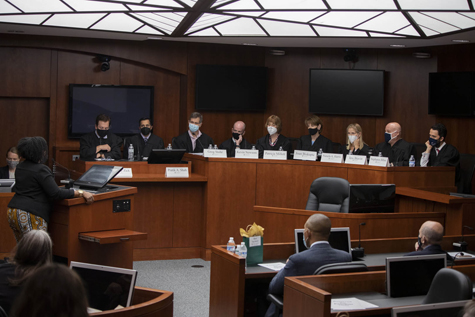
Tiffany Wright (Orrick, Herrington & Sutcliffe LLP/ Howard University) and Meaghan VerGow (O’Melveny & Myers) were the advocates arguing before the Court. Joan Biskupic (CNN) served as Chief, and justices included Pamela Harris (U.S. Court of Appeals, 4th Circuit), Stephanos Bibas (U.S. Court of Appeals, 3rd Circuit), Patricia Millett (U.S. Court of Appeals, D.C. Circuit), Kevin Newsom (U.S. Court of Appeals, 11th Circuit), Pratik A. Shah (Akin Gump Strauss Hauer & Feld LLP), Jess Bravin (Wall Street Journal), Greg Stohr (Bloomberg) and Timothy Zick (William & Mary Law School).
In a 7-2 decision, intended purely as an academic exercise, the moot court decided to remand the case to the lower court for additional fact-finding. The moot court justices requested more information on the degree of discretion afforded to New York state officials in determining whether an applicant has shown proper cause to carry a weapon. Two justices dissented, finding that the Second Amendment does not include a right to carry a gun outside the home.
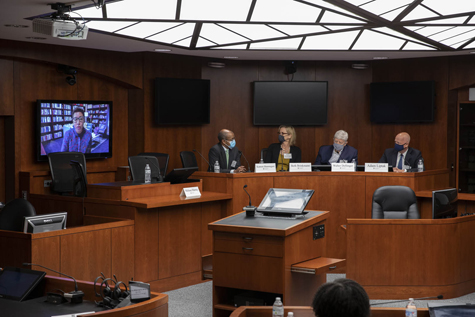 The evening concluded with a panel on “The 2021 Term and Stare Decisis: The future of Roe, Grutter, and more.” Adam Liptak (New York Times) was the moderator, and panelists included Melissa Murray (NYU Law, who joined via video link), Kannon Shanmugam (Paul | Weiss), Beth Brinkman (Covington & Burling) and Walter Dellinger (O’Melveny & Myers).
The evening concluded with a panel on “The 2021 Term and Stare Decisis: The future of Roe, Grutter, and more.” Adam Liptak (New York Times) was the moderator, and panelists included Melissa Murray (NYU Law, who joined via video link), Kannon Shanmugam (Paul | Weiss), Beth Brinkman (Covington & Burling) and Walter Dellinger (O’Melveny & Myers).
The Preview continued on Saturday morning with panels on “Election Law Beyond 2020,” “The Next Wave of Civil Liberties Controversies,” and “What to Expect from the Criminal Law Docket and lingering questions on Qualified Immunity.”
Three afternoon breakout sessions examined the Bipartisan Commission on Supreme Court Reform, the role of the Biden Solicitor General and what’s in store for the shadow docket, and judging in a pandemic and fraught election year.
The Preview concluded with two afternoon panels: “’Are we all textualists now?’ A look at the business cases and statutory interpretation puzzles on the docket,” and “Challenges Under the Religion Clauses.”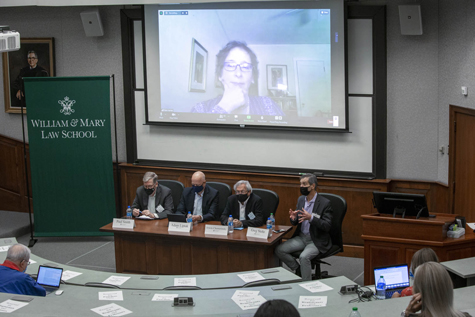
In addition to providing expert insight into the upcoming Supreme Court term, the Preview is intended to greatly bolster the educational experience at the Law School.
“This is a really important event for our students,” said A. Benjamin Spencer, Dean and Chancellor Professor of Law at William & Mary Law School. “The most important thing to me is that the students, whether participating in person or virtually, get a lot out of it. This is part of the academic experience, and that's why we’re here.”
One of those students, Danielle Musselman ’22 attended the panel on judging during the pandemic and was interested to hear the judges explain the drawbacks and benefits of zoom/audio oral arguments.
“Nearly all the judges agreed that there is significant loss to the process by doing the arguments remotely, but they acknowledged that the remote format helped the less wealthy parties because they didn’t have to pay for anyone to travel,” Musselman said. “The panel highlighted that COVID created much difficulty for our legal system but also some possibly very important innovations for equity and better administration.”
As a member of the Moot Court Team, Silvana Gross ’23 was eager to see the Moot Court in action and get a better understanding of the legal issues at play.
“I was also excited just to be in the presence of some of the jurists, because they’re super renowned,” Gross said. “I’m inspired by a lot of their work and appreciative that William & Mary brought them here so that I could have the opportunity to talk to them.”
In his first month as a 1L, Brendan W. Clark ’24 credits the IBRL as one of the flagship programs that drew him to William & Mary Law School.
“My experience at the Preview affirmed that William & Mary has so much to offer in the world of legal discourse: a rigorous program focused on intellectual development and engagement, with ample opportunity for students to engage with leading figures in the field of constitutional law,” Clark said. “From the opening and entertaining moot court addressing contemporary issues to panels on recent constitutional issues—such as the ‘shadow docket’—Preview certainly left me with a strong impression of the intellectual vibrancy of the William & Mary community.
As a volunteer, too, Clark witnessed the dedication of many 2Ls and 3Ls who helped make the event happen. He also had a few of his own “once in a lifetime” experiences, including serving as a driver for a former Solicitor General.
Professor Larsen thanked the staff and students who worked tirelessly to make the event both live and virtual, including Conference and Event Coordinator Ali Trivette and Courtroom Technologist Whit Weidner, as well as students Erica Schuler ’22 and Adam Davis ’23. Larsen also thanked former IBRL director Neal Devins for offering encouraging words and advice.
“They’ve really pulled off quite a feat to host this in person and also virtually during a pandemic with a constantly shifting landscape,” Larsen said. “I couldn't have done it without them, and I’m so, so grateful.”
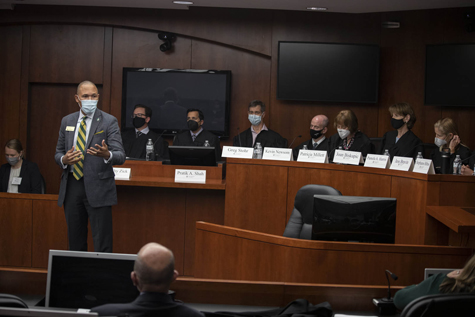 Witnessing his second Supreme Court Preview since he joined the Law School in July 2020, Dean Spencer thanked the many participants who took time from their busy schedules to travel to Williamsburg, don masks during the pandemic, and share their knowledge in person.
Witnessing his second Supreme Court Preview since he joined the Law School in July 2020, Dean Spencer thanked the many participants who took time from their busy schedules to travel to Williamsburg, don masks during the pandemic, and share their knowledge in person.
“I’ve heard how highly valued this event is in the community, and it’s really one of the premiere events, not just at this law school, but, I think, in the country,” Spencer said. “We want to keep it going forward and make sure it stays strong.”
About William & Mary Law School
Thomas Jefferson founded William & Mary Law School in 1779 to train leaders for the new nation. Now in its third century, America’s first law school continues its historic mission of educating citizen lawyers who are prepared both to lead and to serve.
